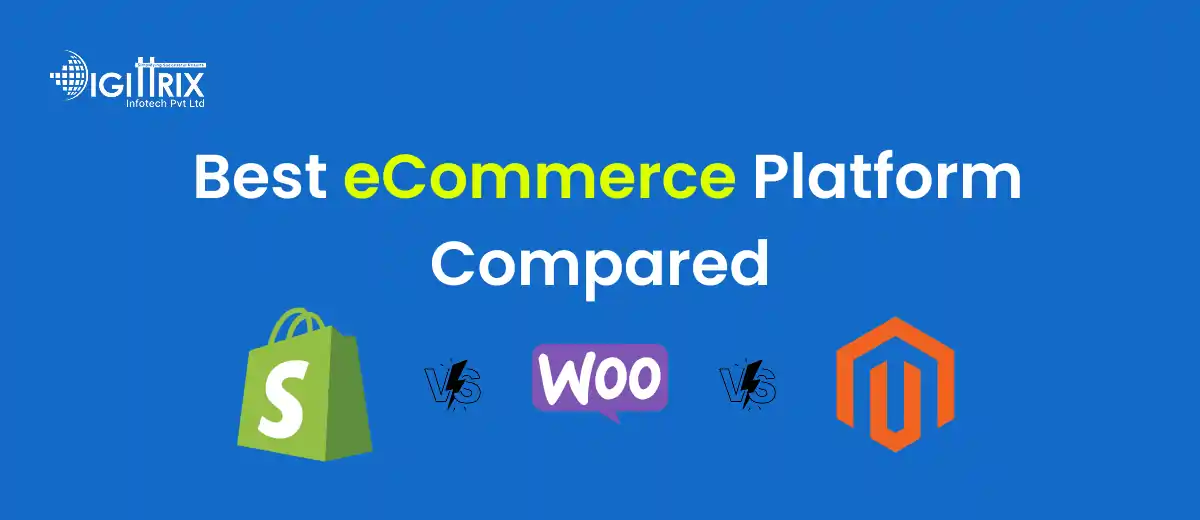Shopify, WooCommerce and Magento support millions of online stores worldwide, facilitating secure transactions, versatile configurations, and growth for businesses of all sizes.
Highlights
With Over 14 years of Experience in the IT Field, Helping Companies Optimise there Products for more Conversions

Choosing the right platform is an essential step in building a successful eCommerce business. Shopify, WooCommerce, and Magento are three widely known platforms, each with its features, benefits, and technical requirements.
In this article, we will compare them based on usability, features, customization, pricing, scalability and how well they work with mobile solutions and app development needs. This guide will help store owners, Android app developers, iOS app developers, and eCommerce app development companies decide which platform fits their business needs best.
Planning to switch your e-commerce platform? Explore our guide on migrating WooCommerce to Shopify in 2025 for a smooth, step-by-step transition.
For those working with an eCommerce app development company, budget decisions should also consider mobile integration, long-term maintenance, and support.
For eCommerce mobile app development, Shopify and Magento have more direct integrations. WooCommerce requires plugins and custom development.
If your business plans to grow, especially with the support of mobile apps, choosing a scalable option is crucial. eCommerce app development professionals can help optimize performance.
Businesses focusing on content-driven marketing and search visibility may prefer WooCommerce. Others can rely on experienced Android app developers and iOS app developers to assist with SEO integration.
eCommerce mobile app development for secure shopping experiences is equally important. Security measures must also cover mobile transactions and user data.
If you work with an eCommerce app development company, they can also provide technical support for all three platforms.
Mobile shopping continues to grow, making eCommerce mobile app development essential for online businesses. Choosing the right platform affects how easily you can create and manage a mobile store.
Need a custom tool for your Shopify store? Learn everything about building tailored Shopify apps to enhance functionality, streamline operations, and grow your business.
When deciding between Shopify, WooCommerce, and Magento, there is no single best platform. Each has strengths depending on your business model, technical skills, and plans.
If you want fast setup and ease of use, Shopify is a good choice, especially if you're working with a Shopify app development service.
WooCommerce is right for those who want more control and already use WordPress. It allows integration with mobile solutions and suits businesses that work with flexible teams, including Android app developers and iOS app developers.
Magento is best for complex businesses looking for complete control. Partnering with an eCommerce app development company is often necessary for building and managing Magento stores. It also suits those planning custom mobile solutions and advanced on-demand app development.
In the end, your platform should support your goals, growth, and customer experience across desktop and mobile.
Choosing the right platform—Shopify, WooCommerce, or Magento—is one of the most important decisions when starting or growing your online business. Each platform offers unique benefits. Shopify is easy to set up and manage, WooCommerce provides complete control and flexibility, while Magento is ideal for larger, feature-rich operations.
At Digittrix, we help you choose the platform that best suits your business needs and offer complete eCommerce development services from start to finish.
With over 14 years of industry experience, Digittrix is a reputable Australian eCommerce app development company specializing in creating reliable, user-friendly online stores. Whether you're beginning or planning a complete digital expansion, our team of skilled Android and iOS developers can help you reach your goals.
If you're unsure where to start or which platform is best for you, book your appointment or consultation today with our expert technical managers by calling +91 8727000867 or email us with any questions at digittrix@gmail.com.

Do you need help in Mobile App development ?




Join over 1500+ businesses we've already helped!
It depends on your business requirements. Shopify is simple to use, WooCommerce provides flexibility, and Magento is ideal for large, complex stores.
Yes, Shopify supports mobile app development via APIs and third-party tools. Many eCommerce app development companies provide Shopify integrations.
Yes, WooCommerce integrates well with custom eCommerce mobile app development, especially for WordPress users familiar with plugins and APIs.
Magento is perfect for enterprises needing full control and advanced features. It often requires a dedicated development team or an experienced company.
Shopify charges monthly fees. WooCommerce is free but needs paid plugins. Magento is free (open-source) but has higher development and hosting costs.

©2026Digittrix Infotech Private Limited , All rights reserved.